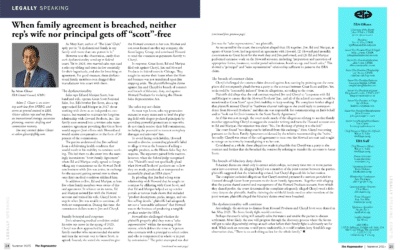The determination is significant because different tax treatment results from the classification of the representatives.
When manufacturers engage representatives to sell their products, a question arises as to whether the representatives are employees or independent contractors of the manufacturer. The determination is significant because different tax treatment results from the classification of the representatives.
If a manufacturer’s representative is treated as an employee, then the manufacturer must withhold from the representative’s wages, federal and state income taxes and FICA (Social Security) and Medicare taxes. As an employer, the manufacturer must also match the amount of FICA and Medicare taxes withheld from the representative’s wages; other federal and state employment taxes are imposed as well. As an employee, the representative is entitled to participate in any employer-sponsored benefit plans, including health insurance plans, qualified retirement plans and other programs if the employee satisfies the eligibility requirements.
Representatives who are treated as independent contractors, on the other hand, receive a gross payment from the manufacturer without any deduction or withholding for federal or state employment taxes. As an independent contractor, the representative is not eligible to participate in the manufacturer’s benefit plans or programs.
In distinguishing between the two classifications, the threshold issue is whether or not the manufacturer has the right to control the actions of the representative. IRS Treasury regulations provide that an employment relationship exists when the person for whom the services are performed has the right to control and direct the individual who performs the services, not only as to the result to be accomplished by the worker but also as to the details and means by which the result is to be accomplished. Accordingly, an employee is subject to the will and control of the employer, not only as to what is to be done but how it shall be done. On the other hand, if an individual is subject to the control or direction of another merely as to the result to be accomplished and not as to the means of accomplishing the same, then the worker is not an employee.
Due to the factual nature of any such determination, each circumstance must be evaluated on its own merits. Many years ago, the IRS issued a revenue ruling listing 20 factors which must be considered in determining whether a worker is an employee or an independent contractor. Some of the factors most relevant insofar as manufacturers’ representatives are concerned are the extent to which the representative must comply with the manufacturer’s instructions; whether training is provided by the manufacturer to the representative; whether the representative is specifically designated as the person personally obligated to perform the services; the hours of work, if any, set by the manufacturer; whether the representative must devote his/her full time to working for the manufacturer; whether the representative must provide oral or written reports to the manufacturer; whether the representative must pay his/her own business expenses; whether the representative must furnish his/her own tools and materials in providing the service and whether the representative is permitted to provide similar services to the general public. Other factors may come into play as well. No one factor is determinative but rather all of the factors are viewed together to determine the representative’s classification as an employee or an independent contractor.
The IRS has issued two consecutive revenue rulings involving manufacturers’ representatives which relate to the employee/independent contractor distinction.
In the first ruling where the representative was deemed to be an employee, the IRS noted that the representative was assigned a specific territory, the company name was required to be exhibited in the representative’s office and in the building directory, the representative was required to maintain consigned inventory and furnish monthly inventory reports to the manufacturer, the representative was prohibited from selling competitive products during the term of the agreement and the contract between the manufacturer and the representative could be terminated by either party on short notice.
In the second ruling, the IRS reached the opposite conclusion. Here the manufacturer entered into contracts with sales representatives who were granted exclusive rights to sell the manufacturer’s products in specified territories, the representatives were required to possess a designated amount of capital to purchase equipment and supplies and the representatives were not required to work specific hours.
The consequences of failing to comply with the correct classification are significant. Most notably, where a manufacturer’s representative is incorrectly classified as an independent contractor, the manufacturer could be liable for payroll taxes which were not paid as well as withholding and other tax obligations. In addition to being obligated to pay taxes for the current and prior years, the manufacturer could be responsible for interest and penalties on the unpaid tax obligation. Aside from federal and state taxes, the employer may also be obligated to provide company-sponsored benefits to the representative which were not provided. Alternatively, where the representative is properly classified as an independent contractor, the representative, not the manufacturer, will be responsible for paying his/her own taxes.
Suffice it to say, manufacturers and their representatives should take appropriate steps to ensure that representatives are properly classified as either employees or independent contractors. The harshest results fall upon a representative improperly classified as an independent contractor. To support independent contractor treatment, there should be a written agreement between the manufacturer and the representative documenting the arrangement which reflects the various responsibilities of the parties and demonstrates the absence of the manufacturer’s control over the representative. As many as possible of the relevant factors that support independent contractor treatment should be reflected in the agreement. The representative should be required to pay his/her own business expenses. There should be a specific term to the agreement and the methodology for terminating the same should be specified. The representative should not have an office on the manufacturer’s premises but rather should have his/her own office, even if the office is in the representative’s home. Where possible, the representative should be permitted to work for more than one organization. Finally, it might behoove all the parties if there are no restrictive covenants such as a non-compete, although many manufacturers are unwilling to provide this flexibility to their representatives.
With significant consequences for improperly classifying workers, manufacturers are encouraged to work with their representatives to support independent contractor status. The failure to do so could be consequential.
Please contact Bruce Bell with any questions at (312) 648-2300 or e-mail at [email protected].



